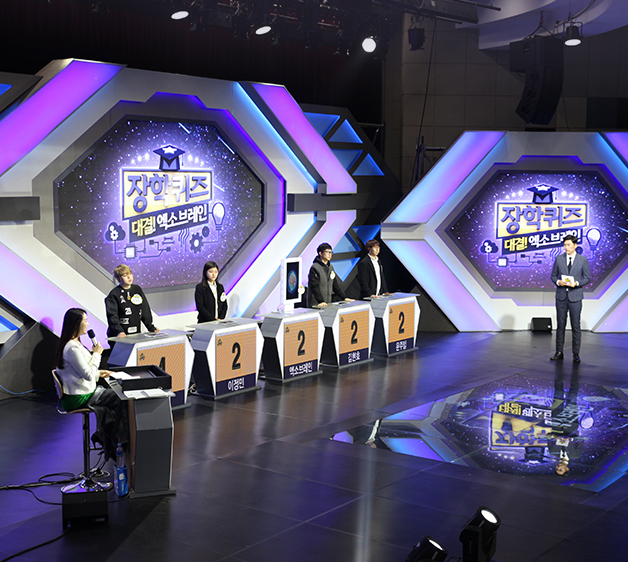
 th Anniversary
th Anniversary
Since EXO-BRAIN won the EBS quiz program in 2016, it made KRW 9.9 billion sales revenue through 70 cases of technology transfer and commercialization projects since 2017. Recently, an in-depth question-and-answer technology that can produce descriptive essay as well as simple answers was successfully developed. The technology is currently used in the legal sector where field-specific terms and Sino-Korean words are often used. For example, when the user asks, “What is the maximum speed limit in School Zones stipulated by the Min-sik Law?” It answers, “It is 30 km/h or below. (Source: Article 12 (Designation and Management of Protection Areas for Children) of Chapter II Ways of Pedestrians to Walk Roads, the Road Traffic Act)."
• • •
Technology that is capable of providing descriptive answers for difficult questions
There is one thing that our super hero Iron Man needs as much as his suit: it’s J.A.R.V.I.S., his AI assistant. AI assistants like J.A.R.V.I.S. that frequently appear in SF movies have seen much development, being implemented in smart phones and so on. However, the current AI service is only capable of doing web searches to find simple documents or providing short answers.
There is one thing that our super hero Iron Man needs as much as his suit: it’s J.A.R.V.I.S., his AI assistant. AI assistants like J.A.R.V.I.S. that frequently appear in SF movies have seen much development, being implemented in smart phones and so on. However, AI assistants that are currently available can only provide weather information, manage schedule, or perform web searches.
In order to overcome such technological limit, a group of Korean researchers recently launched an innovative growth engine project, "EXO-BRAIN," and succeeded in commercializing advanced language AI technology. This will create a greater momentum for the development of Korean language-based AI services such as AI assistant, natural language question-and-answer, intelligent search and Big Data analysis.
This technology is capable of producing descriptive answers to difficult questions beyond the level of conducting simple web searches to find documents, or providing short answers to questions. Researchers used this technology to successfully develop an "in-depth question-and-answer technology for general knowledge," and an "in-depth question-and-answer technology for legal knowledge," confirming the possibility of commercialization.


Installed in the Hancom Office 2020
Knowledge Search function
An in-depth question-and-answer technology for general knowledge developed by the researchers analyzes information in Wikipedia to find answers to questions. In other words, the machine firstly classifies the question type, and then applies the optimal answer-finding method for each question type to find the answer.
This technology goes beyond the conventional web search technology, which finds documents based on matching words. It is a technology where the computer understands the language that the human inquirer uses, and then deduces the right answer for the given question. To realize this technology, researchers developed a neural-symbolic hybrid question-and-answer technology using the natural language-understanding technology based on the symbolic approach and the KorBERT deep-learning (neural) language model technology. Then, the researchers successfully implemented the technology to the general and legal fields.
EXO-BRAIN's question-and-answer technology in the general field is installed in "Hancom Office 2020" released in September 10 last year as the Knowledge Search function. Users can enter questions in the Knowledge Search function and reflect the answers that they get in the document that they are editing. Hancom Inc. revealed that EXO-BRAIN's service showed more than 10% higher performance than Google’s service in the field of general knowledge as a result of a direct comparison.
Currently installed in Hancom Office 2020, EXO-BRAIN developed by ETRI has already gone through successful commercialization. It is applied with natural language analysis technology, deep-learning language modeling technology, question-and-answer technology, and more.
For instance, to develop an AI service on the theme of "fashion search," the conventional technologies required a long period of preparation for language processing. However, ETRI’s EXO-BRAIN API enables developers to focus more on the service.
ETRI revealed two types of spoken language analysis technology: morpheme analysis technology and named-entity recognition technology. The technologies revealed by ETRI follow the TTA standard guideline, which includes 47 morpheme tags and 146 named-entity tags. The morpheme analysis technology is a technology that analyzes the smallest meaningful unit in Korean language, being utilized as an essential part of Korean language processing technology.

ETRI makes advanced science technology in SF movies a reality
The ETRI researchers revealed an upgraded written language analysis API in addition to the spoken language analysis API. In terms of the additionally revealed APIs, both the morpheme analysis and named-entity recognition technologies showed high accuracy of 96.80% and 89.40%, respectively.
Dr. Yim Jun-ho from the Language Intelligence Research Lab at ETRI said, “Although the EXO-BRAIN language analysis technology was developed for analysis of encyclopedia and legislations, it is widely applied to the field of spoken language. Through the unveiling of the spoken language analysis API, we hope to see improved accuracy and reliability of language analysis, and vitalization of the Korean AI market.”

EXO-BRAIN's question-and-answer technology for the legal field is a technology where the computer understands knowledge in the legal field that uses many technical terms and Sino-Korean words to answer the user's questions. Most of the answers provided by the program are in descriptive format, which is considered as high-level skills. This technology was implemented in 2020 after successfully completing demonstration tests conducted by the National Assembly Library and National Research Council of Science and Technology.
The EXO-BRAIN project group recently completed 22 cases of technology transfer and 17 commercialization projects over the last three years, preventing foreign AI solutions from dominating the Korean market while widening the range of service application. Through continued performance improvement of the deep-learning language model and further disclosure, ETRI plans to contribute to sophistication of AI technology and platform development. ETRI's quest to realize the science technologies of SF movies continues.